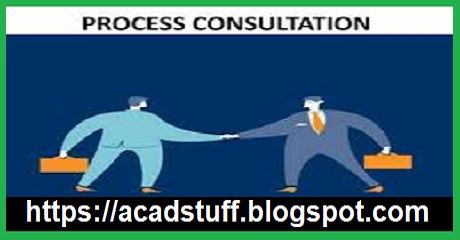Process Consultation
Process Consultation is a set of activities provided by a consultant that helps members of an organization to perceive, understand and act on the process events that occur in their work environment. A process consultant helps the staff members of an organization to obtain insights into their organizational processes, their consequences, and the mechanism to bring about positive changes within the organization. The ultimate goal of process consultation is to help the organization diagnose its problems and generate a solution for the same.
Areas of process
consultation
There
are five main areas of process consultation namely improving communication,
clarifying functional roles of group members, supporting decision-making, specifying group
norms and growth, and ensuring effective leadership.
Communication
An
administrator is expected to understand the nature and style of the
communication process in an organization and a process consultant helps in doing
so through observing the communication pattern in the organization followed by
feedback. He/she looks at who communicates with whom, for how long and how
often, what is communicated, and how it is communicated. After collecting and
analyzing data about communication, the consultant recommends some relevant
measures to be taken to improve communication in the organization.
Functional Roles of Group
Members
An
administrator needs to make sure that the agreed roles are performed by staff
members in the organization to ensure effectiveness. The consultant through
process consultation provides techniques that help the staff members clarify self-related activities such as self-identity, influence, and their power practices within the
organization. The consultant also suggests ways to improve task-related activities
such as obtaining and providing information, coordinating, setting standards, and evaluating. Another area of functional roles of group members is group
maintenance activities involving encouraging, supporting, harmonizing, and compromising.
The
assumed roles of the organizational members are carefully observed by the
process consultant. He/she helps the management personnel to identify and
diagnose such group dysfunctions to be worked on. Power struggles and preoccupation with self-interests can be factors for dysfunctionality within an organization which can
occur due to an overemphasis on task-related activities resulting in the exclusion
of group maintenance activities.
Decision Making
A very important component of an effective group is
decision-making. The administrator makes decisions by identifying
problems, examining the alternatives, making decisions, and implementing the
decisions. The consultant in his/her process consultation supports the
organization to make relevant decisions. For example, a few techniques he/she can
provide to administrators of the organization that while making decisions group
leader can ignore a suggestion made by the group and refuse to discuss the
same. He/she can use authority and make the subordinates comply with
his/her decision. An administrator can
use the majority rule or the consensus method.
Group Norms and Growth
Groups
of people who work together develop group norms and standards of behavior. The
consultant during process consultancy can help the organization to understand
the group norms and the effect of these norms on the group functioning.
Leadership
The
process consultant can help the group understand the various leadership styles
and help the administrator to adjust their style to better fit the situation. This will help the
administrators to understand their own behavior and how others react to such
behavior.
Conclusion
Process consultation is
aimed to facilitate organizational change by helping the administrators to be
aware of the process of change, the consequences of the processes, and the
mechanisms by which change can be brought.

